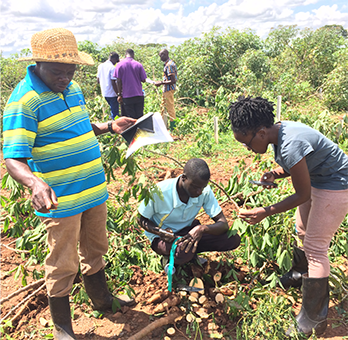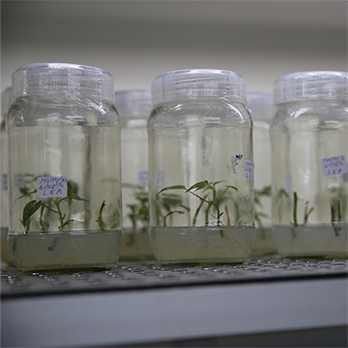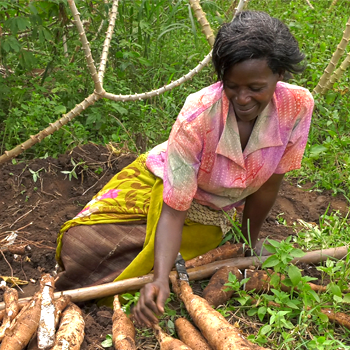 The Breeding Division, led by Chiedozie Egesi, serves as the fulcrum of the project. To improve cassava populations and breeding pipelines and extensively test improved clones for variety release, this division implements breeding pipelines at four breeding programs in Africa: the National Root Crops Research Institute (NRCRI), Umudike, Nigeria; the International Institute of Tropical Agriculture (IITA), Ibadan, Nigeria (with additional support from IITA/Uganda); the National Crops Resources Research Institute (NaCRRI), Namulonge, Uganda; and the Tanzanian Agricultural Research Institute (TARI), Ukiriguru, Tanzania.
The Breeding Division, led by Chiedozie Egesi, serves as the fulcrum of the project. To improve cassava populations and breeding pipelines and extensively test improved clones for variety release, this division implements breeding pipelines at four breeding programs in Africa: the National Root Crops Research Institute (NRCRI), Umudike, Nigeria; the International Institute of Tropical Agriculture (IITA), Ibadan, Nigeria (with additional support from IITA/Uganda); the National Crops Resources Research Institute (NaCRRI), Namulonge, Uganda; and the Tanzanian Agricultural Research Institute (TARI), Ukiriguru, Tanzania.
Pre-breeding for traits relevant to Africa and aid in germplasm acquisition is carried out in two other breeding programs in South America, the International Center for Tropical Agriculture (CIAT) and the Brazilian Agricultural Research Corporation (Embrapa). Other centers, such as the United States Department of Agriculture Agricultural Research Service (USDA-ARS) Pacific West and the University of Hawaii at Hilo, play roles as centers for phytosanitary certification and as international nurseries for cassava germplasm transfer in a disease-free environment.
To build capacity in Africa’s breeding programs, NextGen Cassava funds students to obtain advanced degrees in plant breeding. Cornell University, the West African Center for Crop Improvement (WACCI) at the University of Ghana, and Makerere University, Uganda are involved in this effort.
To build a community of practice partnership (COPP) with the goal of genomics-assisted cassava breeding across African cassava breeding programs, potential partners in Ghana, Rwanda, Malawi, Mozambique, Sierra Leone, Zambia and DR Congo. These cassava breeding teams will benefit from the genomic predictions that we have already developed for African cassava germplasm (varieties they also share), use of Cassavabase, and capacity for improved phenotyping, all of which will lead to better breeding decisions and improved livelihoods for African cassava farmers.
 The Research Division partners with the Breeding Division to improve NextGen’s ability to deliver high-valued varieties rapidly and efficiently. Under the leadership of Jean-Luc Jannink, this division develops and implements technological advances throughout the project, answers technology and research questions from breeders, and proposes new technologies breeders might not have considered.
The Research Division partners with the Breeding Division to improve NextGen’s ability to deliver high-valued varieties rapidly and efficiently. Under the leadership of Jean-Luc Jannink, this division develops and implements technological advances throughout the project, answers technology and research questions from breeders, and proposes new technologies breeders might not have considered.
The Research Division is comprised of breeders and personnel at BTI, Cornell, USDA-ARS, Makerere University, CIAT, and Embrapa. Its deliverables make their greatest impact when they are deployed by the breeders in the field and lab.
Research Division activities include: flowering and seed set, breeding scheme optimization, Cassavabase development, genomic prediction and decision analysis support, and bioinformatics for improving prediction accuracies.

Adoption of new varieties developed under NextGen in Nigeria, Uganda, Tanzania and the rest of Africa will ultimately be determined by the acceptability of these varieties to the diversity of farmers, processors and consumers that use them. Furthermore, for breeding programs with poverty alleviation and development goals, accelerated genetic gain should translate to gender equitable benefits for smallholder farmers.
Under Hale Ann Tufan, the Survey Division’s role is to develop actionable breeding targets for product profiles that meet diversity and demand. Survey division oversees country specific studies on user typologies, associated trait preferences and descriptors, relative and economic weights of traits and large scale on farm performance evaluation. These studies are complemented with gender focused research on evaluating the economic value of gender-responsive breeding, foresight analysis and intrahousehold studies on trait prioritization. Acting like the marketing arm of a private seed company, it translates research from our partner project RTBfoods, and conducts additional research to identify traits preferred by farmers for selected product quality. This ensures that NextGen breeding is demand-driven and inclusive.





